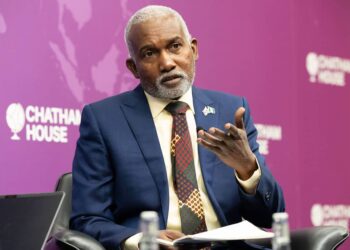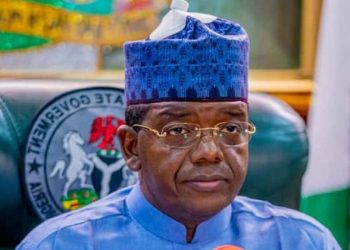Every Nigerian you know has a relationship with petrol. It is either they are fueling their generators, their cars or they are paying higher for transportation, because petrol costs more. So whether they agree expressly or not, petrol has an impact on their day to day lives.
And you may as well know that when a Nigerian hears the acronym “NNPC,” petrol comes to mind. For decades, Nigeria’s premier state-owned oil company has been synonymous with petrol. Whether in fuel scarcities or price increment, in the last three decades, NNPC has had a stake in how Nigerians viewed petrol.
Following the recent dissolution of the NNPC board by President Bola Tinubu, many Nigerians are hopeful that this change in leadership would spell better for them.
President Tinubu, on 2nd April 2025 reconstituted the board of the Nigerian National Petroleum Company Limited (NNPCL), removing Group CEO Mele Kyari, board chairman Chief Pius Akinyelure, and 11 other board members. In their place, he appointed new members, with Engineer Bashiru Ojulari as the Group CEO (GCEO) and Ahmadu Musa as the non-executive chairman.
1. Let us start with President Tinubu’s expectations for the new board: The President wants the NNPC to increase Nigeria’s share of crude oil refining output to 200,000 barrels per day by 2027 and 500,000 by 2030, while boosting total crude production to 2 million barrels daily by 2027 and 3 million by 2030.
2. Beyond the president’s vision for the new board, Nigerians have their own expectations. One major hope is that the board’s wealth of experience will finally bring an end to the country’s persistent fuel scarcity. For years, Nigerians have endured fuel shortages, with the removal of fuel subsidies exacerbating the crisis. Long queues at filling stations and soaring fuel prices have left citizens frustrated. Many now look to the new board to implement effective solutions that will stabilize fuel supply and pricing and also bring about a drop and stabilization in fuel prices.
3. Another pressing concern is the full operationalization of Nigeria’s refineries. The new GCEO, Engineer Ojulari, has been tasked with restoring investor confidence in NNPC and ensuring that refineries in Warri, Port Harcourt, and Kaduna—reportedly 70% completed—become fully functional. The National Publicity Secretary of the Independent Petroleum Marketers Association of Nigeria (IPMAN), Chinedu Ukadike, has expressed strong support for the board’s reconstitution. He urged the new leadership to expedite refinery operations, ensuring affordable fuel availability and job creation for the masses. He also called on the board to resolve disputes between NNPCL and the Dangote Refinery to facilitate seamless fuel distribution across the country.
4. Similarly, Prof. Evans Osabuohien commended President Bola Tinubu for removing both the Chairman, Board and Group Chief Executive Officer (GCEO). Osabuohien, who is Head of the Economics Department at Covenant University in Ota, said sacking the NNPC board would help to check sharp practices in the petroleum sector. “The sacking of the NNPC board was a right step in the right direction,” he said. “There is the need for a holistic probe of that sector. This will make the sector vibrant and be contributing positively to the economy and generating employment opportunities in the country,” he added.
The one major takeaway from Prof. Osabuohien’s comments on the board dissolution is his call for the Federal Government to look into the recent conflict between the NNPC and Dangote Group. Every Nigerian that buys fuel knows that there is no love lost between the two agencies, and like they say, when the elephants fight, the grass suffers. Nigerians are paying higher costs for fuel because of this strained relationship. Whether it is the Naira for Crude deal, or the unhealthy competition between the two, the new board needs to do well to fix this.
5. Nigerians also expect improvements in energy security, operational accountability, and commercial viability to attract foreign investment. The Nigerian Extractive Industries Transparency Initiative (NEITI) has urged the new board to uphold transparency in data disclosure, financial statements, and operational costs, as well as ensure accurate and consistent revenue remittances.
6. Another key area of concern is the completion of critical energy projects. In 2022, former GCEO Mele Kyari announced that the Ajaokuta-Kaduna-Kano (AKK) gas pipeline would be completed by the first quarter of 2023. However, as of 2025, the project, along with several others—including the Zabazaba deepwater project (150,000 barrels per day), Chevron’s Nsiko project (100,000 bpd), ExxonMobil’s Bosi field (140,000 bpd), and the Satellite Field Development Phase (80,000 bpd)—remains unfinished. Experts believe that the reason for the delay is due to the inefficiencies in licensing and many more bureaucratic challenges. In order to solve this problem and bring the completion of these projects, the board, spearheaded by Ojulari should aim to attract competent players and remove regulatory hindrances to unlock these resources as not doing so could further stifle production growth and reduce output in key fields.
As the newly reconstituted NNPC board takes charge, Nigerians are eager to see real change. The expectations are high—fuel scarcity must end, refineries must become operational, transparency must be upheld, and delayed projects must be completed. Nigerians will be watching closely to see whether the board can meet these expectations.






